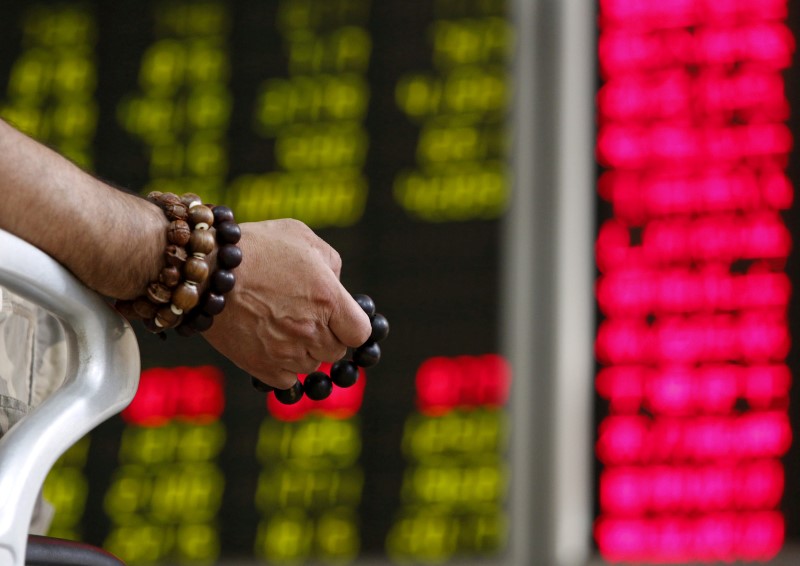By Dion Rabouin and Michelle Price
NEW YORK/HONG KONG (Reuters) - China's stocks took a major step toward global acceptance on Wednesday, finally winning a long campaign for inclusion in a leading emerging markets benchmark, in what was seen as a milestone for global investing.
U.S. index provider MSCI said on Wednesday Hong Kong time it would add a selection of China's so-called "A" shares to its Emerging Markets Index (MSCIEF) after having rejected them for three years running.
In the broader overhaul, MSCI surprised many investors by failing to upgrade Argentina from the frontier market category where it has languished in recent years, but said it would consult investors about adding Saudi Arabia to the benchmark.
Inclusion in the index marks a key victory for the Chinese government, which has been working steadily over the past few years to open up its capital markets, investors said.
"Given the size and importance of China as an economic superpower, I think this is a historic moment," Kevin Anderson, senior managing director of State Street Global Advisors and head of investments in the Asia Pacific region told Reuters.
"It's a long-awaited and much-debated decision in the past, and I think it's more than symbolic as it will create additional flow of capital and potentially a new segment of institutional investors in the China market."
Traders said MSCI's widely expected "Yes" decision had been largely priced in, with the announcement triggering some profit-taking in blue chips, which are no longer cheap after strong rallies this year.
Shanghai shares (SSEC) opened just 0.3 percent higher, dipped into negative territory, and then rallied to end the day up 0.5 percent. The blue-chip CSI300 Index (CSI300) shook off early profit taking to finish up 1.2 percent at its highest close in 1-1/2 years.
MSCI has been in discussions with Chinese regulators and global investors for four years over whether to add yuan-denominated shares to the Emerging Markets Index – tracked by around $1.6 trillion in assets – but excluded them because of restricted access to China's equity markets.
On Wednesday, the company said China had made enough progress in opening up its markets for MSCI to add a selection of 222 large-cap stocks.
The bulk of the shares will be financial and industrial companies, many state-owned. According to Credit Suisse (SIX:CSGN), among the 222 stocks on the simulated list of constituents for the new proposal of China A-share inclusion, 50 are in the financial sector with a total weight of 36 percent, and 44 stocks are in the industrial sector with a total weight of 16 percent.
The stocks, which would represent a weighting of just 0.73 percent in the benchmark, will be included via a two-phase process in May and August next year.
The move will see around $17 billion to $18 billion of global assets move into Chinese stocks initially, MSCI executives told reporters, adding that over the long term the full inclusion of the China market could see more than $340 billion of foreign capital flow into the country.
Sebastien Lieblich, global head of index management research at MSCI declined, however, to provide a likely timeline for the full inclusion of "A" shares, saying it would depend on continued progress on China's reform agenda.
MSCI, he noted, would like to see China further relax controls on repatriating capital out of the country, and act to curb frequent share suspensions.
"It's really in the hands of the Chinese stakeholders, they are dictating the timing. It's very difficult for us to articulate any type of timeline with respect to further inclusion," Lieblich told reporters.
The China Securities Regulatory Commission, which has overseen many key reforms in recent years, welcomed MSCI's decision.
"The inclusion of 'A' shares in the MSCI index is in line with the inevitable needs of international investors and reflects the confidence of international investors in the good prospects for China's economic development and stability of the financial market," the CSRC said in a statement.
RELAXED CRITERIA
MSCI in March relaxed its criteria for inclusion by cutting the number of proposed stocks to 169 from 448 in a bid to address ongoing curbs on repatriating capital from China and investor concerns over the country's high number of suspended stocks.
The 169 stocks can be easily accessed by foreigners through the "Stock Connect" link launched in 2014 and significantly expanded in December.
MSCI said it had increased the selection to include a further 53 domestic Chinese stocks that are also listed in the Hong Kong market, and which will be better known to foreign investors.
Chinese companies listed overseas already account for 28 percent of the EM Index as of May but the addition of domestic, yuan-denominated China stocks could see the country account for as much as 40 percent of MSCI's Emerging Market Index in the future.
The A-share market, including shares from Shanghai and Shenzhen markets, is worth roughly $7.5 trillion, the world's largest after the New York Stock Exchange and Nasdaq.
BlackRock Inc (N:BLK), the world's largest asset manager, endorsed MSCI's decision.
"We believe our clients will benefit from today's decision to bring Chinese equities into mainstream investment," said Ryan Stork, BlackRock's chairman for the Asia-Pacific in Hong Kong and one of the company's most senior executives, in an emailed statement.

Failing to upgrade Argentina means the country remains in MSCI's smaller frontier markets index, where it has been since 2009. Nigeria will also remain a frontier market, with the possibility of being downgraded to "standalone" status.